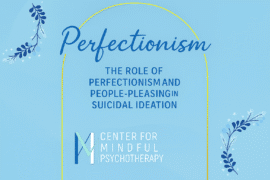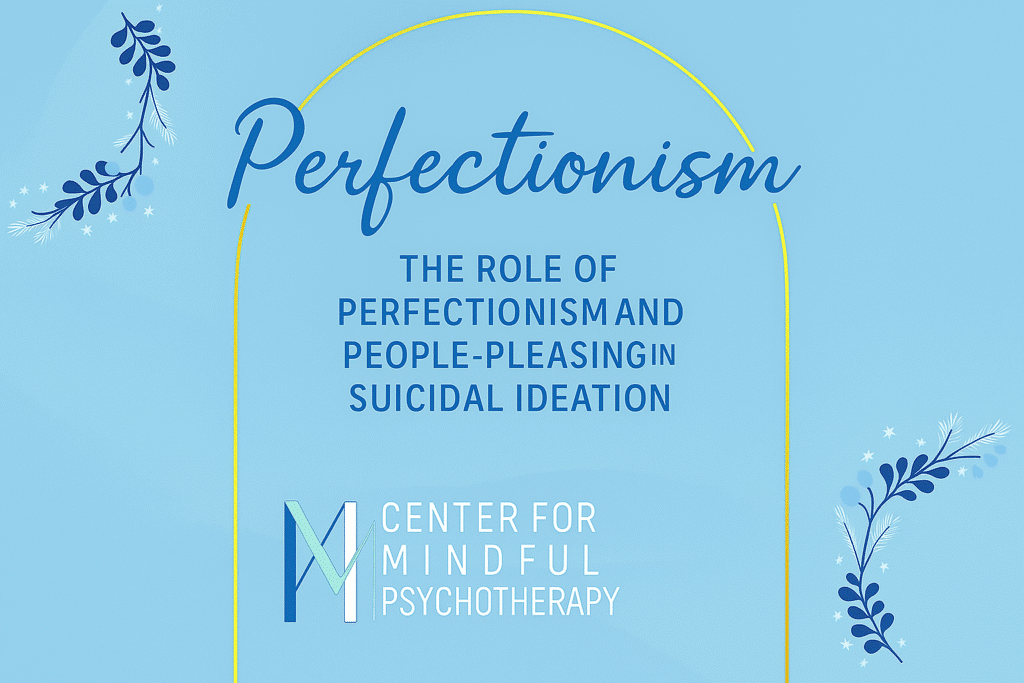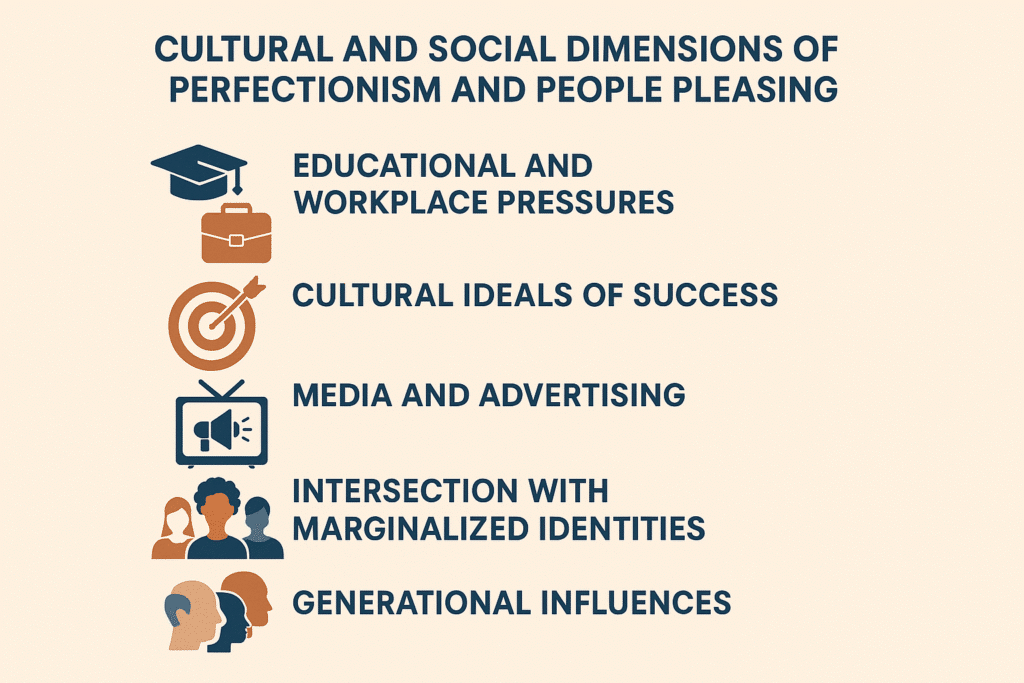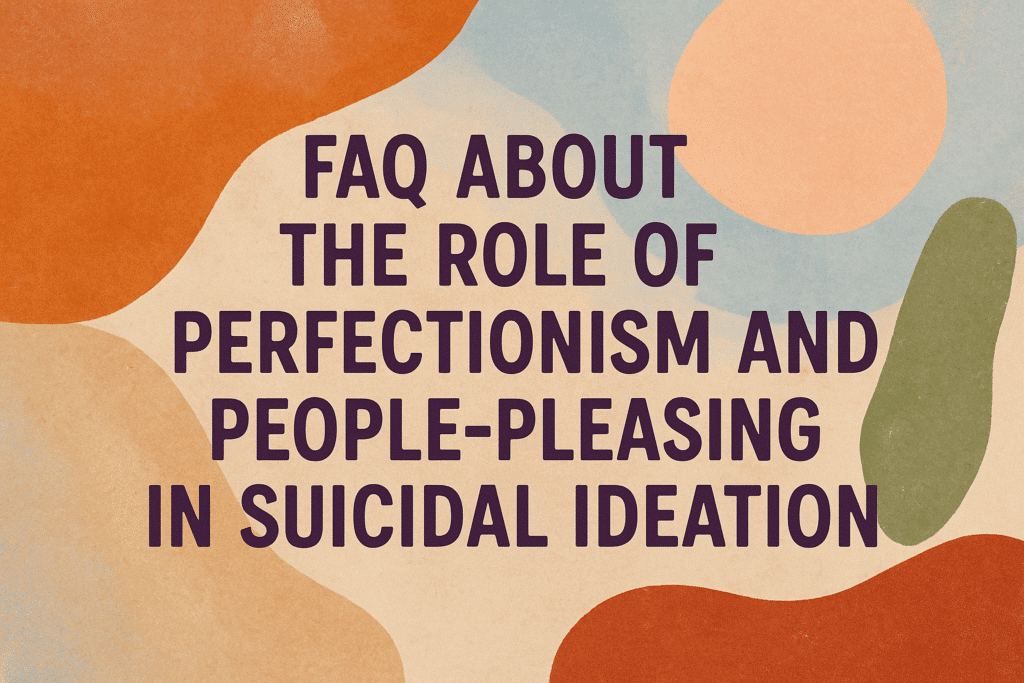

Suicidal thoughts do not emerge in isolation. They often take root in patterns of thinking and behaving that place unbearable pressure on individuals. Among the most significant of these patterns are perfectionism and people-pleasing. The role of perfectionism and people-pleasing in suicidal ideation is profound because both tendencies create impossible standards, leave little room for authentic self-expression, and contribute to chronic feelings of failure or unworthiness. Understanding these dynamics allows therapists and communities to support individuals with greater compassion and clarity.
find a therapist
How Perfectionism Fuels Suicidal Thinking
Perfectionism is often mistaken for a positive trait. In workplaces and schools, striving for excellence is praised and rewarded. Yet perfectionism is more than dedication or ambition. It is a rigid mindset in which mistakes are equated with personal worth and success is seen as the only acceptable outcome.
Research shows that perfectionism is strongly associated with suicidal ideation. People who internalize the belief that they must always succeed often experience relentless self-criticism. When they inevitably fall short of their impossible standards, shame and despair can become overwhelming. Instead of viewing setbacks as learning opportunities, perfectionists may see them as evidence of unworthiness.
The pressure of perfectionism also isolates. Because failure feels catastrophic, perfectionists may hide struggles from others, fearing judgment or rejection. This secrecy reinforces suicidal thoughts by cutting individuals off from the very support that could ease their burden.
The Trap of People-Pleasing
People-pleasing is another pattern that increases vulnerability to suicidal ideation. Rooted in the need for acceptance, people-pleasing involves prioritizing the needs and desires of others over one’s own well-being. It often develops in childhood, particularly in environments where love or safety seemed conditional on compliance or performance.
At first glance, people-pleasing may appear harmless or even kind. Yet beneath the surface lies a constant fear of rejection and a loss of authentic identity. Individuals who chronically prioritize others often neglect their own needs, leading to exhaustion, resentment, and a sense of invisibility.
When people-pleasers feel that they cannot keep up with demands or that they have let others down, suicidal ideation may surface. The belief that one’s worth is tied to service or approval can become unbearable when approval feels out of reach.
When Perfectionism and People-Pleasing Intersect
Perfectionism and people-pleasing often coexist. The drive to meet impossibly high standards blends with the need to satisfy others’ expectations. This intersection creates a double bind in which individuals feel they must never fail while also ensuring that everyone around them is happy. The result is relentless pressure, chronic stress, and an absence of self-compassion.
In this environment, suicidal ideation may arise as an escape from unending demands. When someone feels they can neither meet their own standards nor stop disappointing others, despair can become overwhelming.
This intersection also creates what psychologists sometimes call a no-win scenario, where every possible choice feels like failure. For the perfectionist-people-pleaser, success does not bring relief but only raises the bar higher, and saying “no” to others can feel like betrayal. Over time, this creates a constant state of vigilance and depletion. In such conditions, suicidal ideation can emerge not only as an expression of despair but also as a desperate search for release from an impossible bind.
From a suicide prevention perspective, recognizing this double bind is critical. Because these behaviors are socially rewarded—high performance at work, generosity in relationships—the underlying suffering is often invisible. Many individuals who struggle in this way do not look “at risk” in traditional assessments. Prevention efforts must therefore go beyond spotting overt signs of crisis and also explore the hidden costs of chronic self-erasure and overachievement. By naming perfectionism and people-pleasing as potential risk factors, we create openings for earlier intervention, conversations about authenticity, and therapeutic support that directly addresses the invisible pressures fueling despair.
Cultural and Social Dimensions
The role of perfectionism and people-pleasing in suicidal ideation cannot be separated from cultural and social contexts. Societies that equate worth with productivity, appearance, or achievement reinforce perfectionistic thinking. Gender expectations also play a role. Women, for example, may feel heightened pressure to be both high-achieving and self-sacrificing, while men may be discouraged from showing vulnerability.
Social media further amplifies these tendencies. Constant exposure to curated images of success and happiness fuels comparison and reinforces the illusion that others are effortlessly perfect. For people already inclined toward perfectionism or people-pleasing, these pressures deepen feelings of inadequacy and isolation.
To understand the broader landscape, it helps to recognize how these cultural and social forces shape vulnerability:
-
Educational and workplace pressures: Competitive academic environments and “hustle culture” often valorize endless productivity, making rest or imperfection feel like weakness.
-
Cultural ideals of success: Different cultures may define worth through family honor, financial success, or social conformity, each of which can magnify perfectionistic or people-pleasing patterns.
-
Media and advertising: Beyond social media, constant exposure to advertising that idealizes beauty, wealth, or lifestyle creates benchmarks that are unattainable for most people.
-
Intersection with marginalized identities: For those navigating racism, ableism, homophobia, or other forms of oppression, the need to over-perform or over-accommodate can become a survival strategy, compounding risk for despair.
-
Generational influences: Families shaped by historical hardship or trauma may consciously or unconsciously pass down messages that survival depends on achievement or self-sacrifice, reinforcing these patterns across generations.
By situating perfectionism and people-pleasing within these larger systems, suicide prevention efforts can move beyond the individual and begin addressing the cultural scripts that make it so hard for people to feel “enough” as they are.
How Therapy Addresses Perfectionism and People-Pleasing
Therapy provides a safe space to examine and interrupt these harmful patterns. Several therapeutic approaches are especially helpful.
- Cognitive-behavioral therapy (CBT) helps clients identify and challenge perfectionistic thought patterns, replacing them with more balanced and compassionate perspectives.
- Narrative therapy allows individuals to explore the stories they have internalized about their worth and to rewrite those narratives in ways that honor authenticity rather than performance.
- Compassion-focused therapy nurtures the capacity for self-kindness, helping clients move away from harsh self-criticism.
- Somatic practices address the bodily tension and exhaustion that often accompany perfectionism and people-pleasing.
Through these modalities, therapy helps individuals reconnect with their inherent worth, independent of achievements or approval.
Building Resilience and Self-Compassion
Healing from perfectionism and people-pleasing involves more than reducing symptoms. It requires cultivating resilience and self-compassion. Clients learn to:
- Set realistic expectations and boundaries.
- Recognize their needs as valid and worthy of care.
- Practice self-acceptance even in the presence of mistakes or perceived failures.
- Build relationships grounded in authenticity rather than performance.
These shifts do not happen overnight. Yet over time, they create a new foundation where suicidal thoughts lose their grip, replaced by a more compassionate and sustainable way of living.
Why This Matters for Suicide Prevention
Recognizing the role of perfectionism and people-pleasing in suicidal ideation matters because these patterns are often hidden beneath socially acceptable behaviors. The perfectionist is praised for high achievement, and the people-pleaser is admired for generosity. Yet beneath the surface, both may be silently suffering.
By addressing these tendencies directly, therapists and loved ones can help individuals move away from despair and toward a life that values authenticity, imperfection, and self-worth. Suicide prevention is not only about crisis intervention. It is also about creating cultures and relationships where people feel valued for who they are, not for what they achieve or how much they please others.
Moving Forward with Therapy
Perfectionism and people-pleasing are deeply ingrained patterns, but they are not unchangeable. Therapy provides tools for self-understanding, healing, and transformation. By dismantling the false belief that worth is conditional, individuals can begin to experience life with greater freedom and authenticity.
If you or someone you know is struggling with suicidal thoughts, immediate help is available through the 988 Suicide and Crisis Lifeline. For ongoing support, therapy provides a safe space to address perfectionism, people-pleasing, and the suicidal ideation they may fuel.
At our practice, some of our associate therapists specialize in modalities that address these patterns directly. We invite you to browse our therapist directory and connect with a provider who can help you move toward resilience, authenticity, and self-compassion.
FAQ: Perfectionism, People-Pleasing, and Suicidal Ideation
Are perfectionism and people-pleasing always harmful?
Not necessarily. Striving for excellence and caring for others can be positive when balanced with flexibility and self-care. The risk comes when achievement and approval become the only sources of self-worth. At that point, these traits shift from healthy motivation to rigid survival strategies that leave little room for mistakes, rest, or authenticity. Suicide prevention efforts need to focus not on erasing these traits entirely but on helping people relate to them differently—valuing achievement and care while also cultivating self-acceptance.
Why do perfectionism and people-pleasing often develop in childhood?
Both patterns are frequently learned as ways to secure love, safety, or belonging. A child who feels only praised for achievements may internalize that they are valuable only when successful. Similarly, a child who feels responsible for soothing a parent’s emotions may learn to suppress their own needs to keep the family stable. Over time, these strategies become hardwired into identity. When adulthood brings more complex pressures, the same strategies can backfire, leading to exhaustion and despair.
How do perfectionism and people-pleasing connect to known suicide theories?
-
Joiner’s Interpersonal Theory of Suicide highlights perceived burdensomeness and thwarted belonging as key drivers of suicidal ideation. Perfectionists may feel like a burden when they fail, while people-pleasers may feel they never truly belong because their relationships are built on performance.
-
Shneidman’s concept of “psychache” describes intolerable psychological pain. The constant self-criticism and invisibility created by these patterns are clear sources of psychache.
-
Attachment theory suggests insecure or conditional early bonds create the foundation for both perfectionism and people-pleasing. These attachment wounds often resurface in suicidal despair.
Why do high achievers or “helpers” often go unnoticed as being at risk?
Because perfectionism and people-pleasing are socially rewarded, those who embody them are often praised for success, generosity, or reliability. This external validation can mask profound inner suffering. Teachers, employers, and even loved ones may see only the achievements or kindness, missing the underlying isolation, exhaustion, and shame. Suicide prevention needs to expand beyond looking for “obvious” symptoms and include asking compassionate questions about how someone is actually experiencing their accomplishments and relationships.
How does culture influence these patterns differently across groups?
Cultural values shape what perfectionism and people-pleasing look like. For example:
-
In collectivist cultures, people-pleasing may manifest as prioritizing family or community harmony, sometimes at the expense of individual needs.
-
In highly individualistic cultures, perfectionism may be fueled by the belief that personal success defines identity.
-
For marginalized groups, the pressure to “prove worth” or avoid confirming stereotypes can intensify both tendencies.
These variations highlight the need for culturally responsive suicide prevention strategies that understand the unique pressures each community faces.
Can therapy really change lifelong patterns of perfectionism and people-pleasing?
Yes, but it requires patience and a layered approach. Therapy does not erase these traits overnight; instead, it helps individuals loosen their grip. Through approaches like cognitive-behavioral therapy (challenging rigid beliefs), compassion-focused therapy (softening shame), and somatic work (releasing tension stored in the body), people begin to separate their worth from performance or approval. Over time, this reduces suicidal risk because life becomes less about meeting impossible conditions and more about embracing authenticity.
What role does shame play in the link between these traits and suicidal ideation?
Shame is often the invisible driver. Perfectionism turns every mistake into a source of shame, while people-pleasing creates shame for having needs at all. Shame isolates, silences, and convinces people they are unworthy of help. Addressing shame directly—through compassionate connection, safe therapeutic relationships, and community spaces that normalize imperfection—is one of the most important suicide prevention strategies for those caught in these patterns.
Are there early warning signs that perfectionism or people-pleasing may be tipping toward suicidality?
Yes. Some indicators include:
-
Increasing secrecy around struggles or mistakes
-
Extreme exhaustion or burnout despite outward success
-
Withdrawal from relationships that once felt supportive
-
Expressions of feeling like a disappointment, burden, or fraud
-
Loss of joy in activities that once felt meaningful
These signs often appear before overt suicidal statements. Paying attention and offering gentle, nonjudgmental inquiry can open doors to support.
How can loved ones support someone struggling with these patterns without reinforcing them?
Loved ones can:
-
Affirm worth independent of achievements or helpfulness.
-
Encourage rest and authenticity, modeling imperfection themselves.
-
Ask open questions like, “How are you feeling underneath everything you’re doing for others?”
-
Avoid praising only performance or self-sacrifice.
This shifts the relational script and helps individuals experience being valued for who they are, not just for what they do.
What makes addressing perfectionism and people-pleasing a form of suicide prevention in itself?
Suicide prevention is not only about crisis lines and hospitalizations—it is also about dismantling the chronic conditions that quietly erode someone’s will to live. By helping people step off the treadmill of impossible standards and conditional worth, we reduce the relentless stress that makes life feel unbearable. Supporting authenticity, imperfection, and self-compassion is suicide prevention, because it restores hope and belonging before despair reaches its breaking point.
More Reading for Suicide Prevention:
- 10 Books to Explore During Suicide Prevention Month
- Suicide Risk During Major Life Transitions (Divorce, Retirement, Moving)
- When Words Aren’t Enough: Alternative Therapies for Suicide Prevention
- Project Semicolon: An In-Depth Look at Its Origins, Growth, and Mission
- What Project Semicolon Founder Amy Bleuel’s Death Might Teach Us About Suicide
- Understanding Suicide Bereavement: How It Differs from Other Forms of Grief and Effective Therapeutic Approaches
- The Role of Narrative Therapy in Rewriting Suicidal Stories
- Intergenerational Trauma and Its Link To Suicide in Families
- How Attachment Styles Relate to Suicidal Thinking
- 12 Mindfulness Practices for Interrupting Suicidal Thinking





